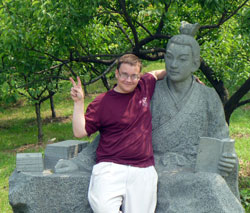 Zachary Larson, Borlaug Summer Intern, is on location at Nanjing Agricultural University and providing us with updates this summer of his trip. Here’s his latest. You can also find a photo album he’s got started here: Borlaug Summer Intern Photo Album
Zachary Larson, Borlaug Summer Intern, is on location at Nanjing Agricultural University and providing us with updates this summer of his trip. Here’s his latest. You can also find a photo album he’s got started here: Borlaug Summer Intern Photo Album
How to become a researcher in a few easy steps, Part 1
So here I now am in China.
Lab life here in China is a bit hectic, and I have certainly been thrown into the middle of it. It is a bit hard to keep your head on straight in a small lab full of 50 grad students, several professors, and a couple of other university students helping out. It is not something that one can get used to quickly, but it is a pace of life that has its own quirks and benefits.
Any time you go into a new working environment there are going to be misconceptions on your own part of what you are going to be doing. Personally, I thought going into the research lab was going to be one of the easier parts of my journey here. Instead it has turned out to be one of the hardest. I have no problem carrying on everyday conversations in Chinese and I have some background in basic genetic techniques from Iowa State. However being in the lab here requires a much greater depth of understanding in both the genetic research that the professors and graduate students here are taking, and the vocabulary that they are using.
So, the last week’s activities can pretty much be summed in that I have learned the functions and experiments of this lab by just following the students here, asking copious amounts of questions, and just getting to know the students and my professor better.
So far, I have learned that this lab, while obviously focused on wheat research, is solely focused with researching and breeding wheat varieties that are resistant against the highly potent red scab and speck wheat diseases. These two diseases are present within wheat populations around the world, but in China they have been traditionally problematic.
While this research seems small, the amount of work in trying to understand a small part of the wheat genome is mindbogglingly. These problems are the main research of the this lab, and the some forty students here all have their own individual problems to research with in this lab. My level of understanding still a bit basic, and it will certainly take me a lot more time to finally get a firm grip on what I am doing as I go further a long in my work here.
